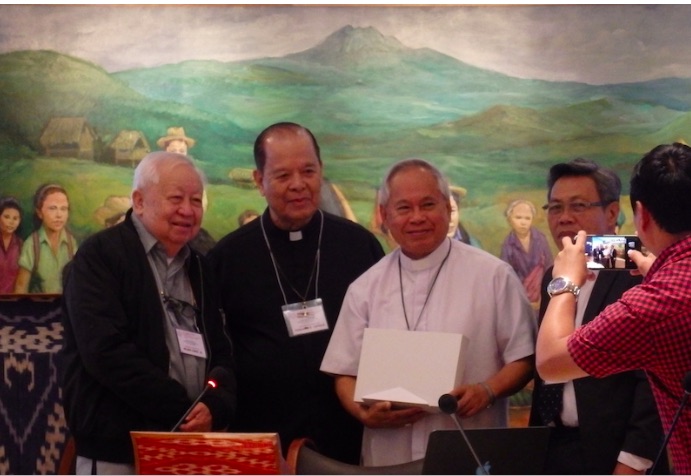TOLERANCE & SOLIDARITY .
An article by Carolyn O. Arguillas from Minda News
“Peace through Dialogue: Our Destiny” is this year’s Mindanao Week of Peace (MWOP) theme.
Held every last Thursday of November until the first Wednesday of December, this year’s celebration from November 29 to December 5 is the 20th Mindanao-wide week of peace that the Bishops-Ulama Forum (now Conference) initiated in 1999, inspired by the annual week of peace in Zamboanga City that the Peace Advocates Zamboanga (PAZ) organized.

OLYMPUS DIGITAL CAMERA
The BUC was born three years earlier, on November 29, 1996.
In their joint statement, the BUC convenors — Archbishop Emeritus Fernando Capalla for the Catholics; Aleem Caboali Cali of the Ulama League of the Philippines, for the Muslims; and Bishop Emeritus Hilario Gomez, Jr. of the United Church of Christ of the Philippines (UCCP) for the Protestants — said dialogue is important because as social beings, “humans are destined to associate in order to survive and to grow in humaneness.”
“It is a natural need and therefore a task,” they said, adding that it is necessary to “be present in person with respect, to speak with sincerity, to listen with interest, to be open to all ideas and to seek the truth,” describing it as “the art of humane dialogue.”
The Joint Statement said underpinning dialogue is “the awareness of being a believer in the Oneness of God Who as Creator brings humans to unity and peace, to integrity and solidarity.”
In a separate message, Mindanao’s lone Cardinal, Orlando Quevedo, OMI, newly-retired Archbishop of Cotabato and prsently Apostolic Administor Sede Vacante of the Archdiocese of Cotabato said dialogue is not mere intellectual discussion but “listening humbly and respectfully to ‘the other,’ listening not only with one’s ears, but most importantly listening with one’s heart” as this transforms hostility and suspicion into understanding and trust.
He said this was the internal process that the government and the Moro Islamic Liberation Front developed through long years of patient dialogue for peace.
(Article continued in right column)
How can different faiths work together for understanding and harmony?
Can peace be achieved in Mindanao?
(continued from left column)
Since 1999
MindaNews tracked down the MWOP themes across two decade, and found a number of them recurring.
1999: Healing the Past, Building the Future
2000: Mindanaoans Journeying Together Towards a Culture of Peace.
2001: Peace: Sharing the Vision of Unity and Hope
2002: Peace through Reconciliation: Mindanaoans seeking a Common Ground
2003: Healing through Forgiveness: Key to Total Human Development
2004: A Reconciled Family, Agent of Reconciliation
2005: Millennium Development Goals: Women and Youth as Partners in Peace Building
2006: In the Name of the Almighty, God of Harmony, Care for the Earth
2007: Building Bridges of Peace with our Peace Officers
2008: Integrity of Mind and Heart a way to Reconciliation and Peace!
2009: Think Mindanao, Feel Mindanao, Bring Peace to Mindanao
2010: Responsive and Responsible Governance: Key to Peace, Development and Sustainability
2011: Common Word between us and you: Love of God, Love of Neighbor
2012: Love of God and Love of Neighbor, A Challenge for Mindanao
2013: Dialogue and Hope: Key to Peace
2014: We pray for long-lasting peace in Mindanao. Give, Share, Live and Proclaim Peace
2015: Mindanaons’ Aspiration for Peace
2016: Healing for Personal and Social Transformation
2017: Owning Mindanao History for Peace and Development
2018: Peace through dialogue: Our destiny
Then President Joseph Estrada issued Proclamation 207 on November 5, 1999, declaring November 25 to December 1, 1999, “and every year thereafter” as the Mindanao Week of Peace, “to provide a venue for the expression in various forms of the peace aspirations of the people of Mindanao and for convergence of peace initiatives.”
The Proclamation said all concerned government agencies and instrumentalities, including government-owned and controlled corporations and members of the private sector and civil society based in Mindanao “are enjoined and encouraged to engage in relevant and meaningful activities in celebration” of the MWOP in coordination with the BUF (now BUC).
It also said the Office of the Presidential Adviser on the Peace Process (OPAPP) in partnership with the secretariat of the BUC Secretariat, “shall provide all the necessary help to ensure a successful coordination of all undertakings during the said week of peace.”
In March 2000, four months after issuing Proclamation 207, Estrada waged an “all-out war” against the Moro Islamic Liberation Front (MILF), displacing nearly a million residents, some of whom returned home only after Estrada was ousted in January 2001.
On November 3, 2000, Estrada issued Proclamation 408, amending Proclamation 207 by resetting the date of the MWOP to the last Thursday of November until the first Wednesday of December of every year thereafter.
The following year, on November 26, 2001, President Gloria Macapagal-Arroyo, who assumed the Presidency in January that year following the impeachment of Estrada, issued Proclamation 127 which was practically a reiteration of Proclamation 207.
Arroyo’s Proclamation declared the last Thursday of November up to the first Wednesday of December of every year thereafter as the Mindanao Week of Peace.